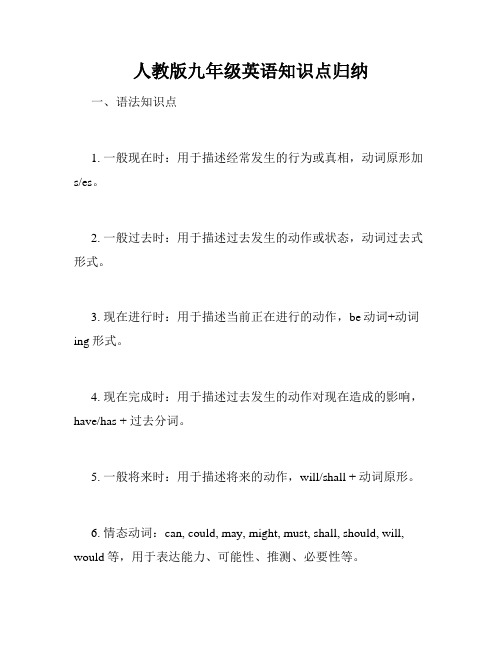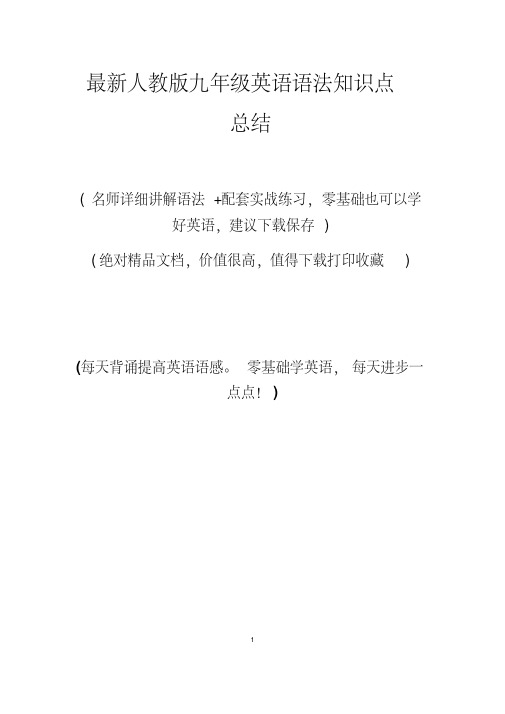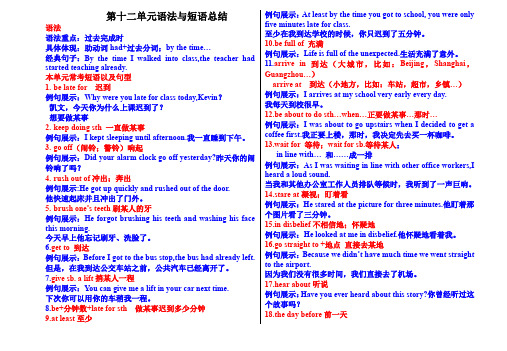人教版英语九年级语法汇总
- 格式:doc
- 大小:176.50 KB
- 文档页数:13

人教版九年级英语知识点归纳一、语法知识点1. 一般现在时:用于描述经常发生的行为或真相,动词原形加s/es。
2. 一般过去时:用于描述过去发生的动作或状态,动词过去式形式。
3. 现在进行时:用于描述当前正在进行的动作,be动词+动词ing形式。
4. 现在完成时:用于描述过去发生的动作对现在造成的影响,have/has + 过去分词。
5. 一般将来时:用于描述将来的动作,will/shall + 动词原形。
6. 情态动词:can, could, may, might, must, shall, should, will, would等,用于表达能力、可能性、推测、必要性等。
7. 定语从句:用于对名词进行修饰和限制,引导词有关系代词和关系副词。
8. 倒装句:用于强调句子中的某一部分,将助动词或情态动词放在主语之前。
9. 被动语态:用于强调动作的承受者,be动词+过去分词。
10. 状语从句:用于修饰句子中的动作或状态,引导词有时间、原因、条件等。
二、词汇知识点1. 动词短语:由动词和副词、介词构成的短语,如give up,look after, think of等。
2. 同义词和反义词:指意义相同或相反的词语,如happy和glad、buy和sell等。
3. 词汇拓展:指根据前缀、后缀或词形变化,拓展词汇的能力。
4. 高频词汇:指经常出现在九年级英语课本和考试中的单词,如important, improve, knowledge等。
5. 词义辨析:指对意义相近但用法不同的词进行区分,如listen和hear、borrow和lend等。
三、阅读技巧1. 主旨大意:通过阅读文章的首句、末句和段落标题等,找出文章的主题或中心思想。
2. 查找信息:通过快速阅读或扫读,找出与特定问题或关键词相关的信息。
3. 推理判断:根据文章中的暗示或细节推断出未写明的信息或作者的观点。
4. 阅读策略:如预测题目、通读全文、找关键词等,帮助提高阅读效率和准确性。

人教版九年级全一册英语Unit4单元语法知识点总结本单元重点短语的具体用法1. used to do:表示过去常常做某事,但现在不再这样做了。
例如:I used to play basketball, but now I prefer swimming.(我过去常打篮球,但现在我更喜欢游泳。
)2. deal with:意为处理、应对。
例如:How do you deal with stress?(你如何应对压力?)3. be proud of:表达为某事感到骄傲。
例如:I am proud of my son's achievements.(我为儿子的成就感到骄傲。
)4. take pride in:与be proud of 意思相近。
例如:She takes pride in her work.(她为自己的工作感到自豪。
)5. from time to time:意思是有时、偶尔。
例如:I still see him from time to time.(我仍然有时会见到他。
)6. in public:指在公共场合。
例如:She is very shy and doesn't like to speak in public.(她很害羞,不喜欢在公共场合讲话。
)7. in person:亲身、亲自。
例如:You should go and see it in person.(你应该亲自去看看。
)8. take up sth:开始做某事,占用(时间或空间)。
例如:He has taken up painting in his spare time.(他在业余时间开始画画。
)9. not...anymore:不再......。
例如:She doesn't live here anymore.(她不再住在这里了。
)10. worry about:担心、担忧。
例如:Don't worry about the exam, just do your best.(不要担心考试,尽力就好。


人教版九年级全一册英语Unit9单元语法知识点总结本单元重点短语的具体用法1. dance to (music):随着(音乐)跳舞- The children danced to the music at the party.(孩子们在派对上随着音乐跳舞。
)2. sing along with:随着...一起唱- I like to sing along with the radio.(我喜欢随着收音机一起唱歌。
)3. musicians who play different kinds of music:弹奏不同类型音乐的音乐家- The band has musicians who play different kinds of music, including pop and jazz.(这个乐队有弹奏不同类型音乐的音乐家,包括流行音乐和爵士乐。
)4. electronic music:电子音乐- Electronic music is becoming more and more popular.(电子音乐越来越受欢迎。
)5. not much:没什么(事)- - How are you? - Not much.(- 你好吗?- 没什么事。
)6. suppose sb to do sth.:猜想某人做某事- I suppose him to be a doctor.(我猜他是个医生。
)7. be supposed to do sth:应该做某事- You are supposed to hand in your homework on time.(你应该按时交作业。
)8. suppose sb (to be) + adj.:原以为...- I supposed her to be honest, but I was wrong.(我原以为她是诚实的,但我错了。
)9. have spare time:有空闲时间- I don't have much spare time these days.(我最近没有太多空闲时间。

人教版初中英语九年级全一册语法知识点汇总动词1.被动语态(passive voice)(1)主动语态和被动语态英语动词有两种语态,即主动语态(active voice)和被动语态(passive voice)。
当主语为动作的执行者时,谓语的形式为主动语态;当主语为动作的承受者时,谓语要用被动语态。
【练习】:判断下列句子为主动句还是被动句,并找出该动作的执行者和承受者。
Many people speak English.Bell invented the telephone in 1876.English is spoken by many people.The telephone was invented by Bell in 1876.(2)被动语态的构成被动语态由“助动词be+及物动词的过去分词”构成。
助动词be有人称、数和时态的变化,其变化规则与be作为连系动词时完全一样。
现以动词ask为例,将一般现在时和一般过去时被动语态的肯定式、否定式及疑问式列表如下:(3)含有情态动词的被动语态含有情态动词的被动语态由“情态动词+ Be + 及物动词的过去分词”构成。
Your room must be cleaned every day.The trees may be planted behind the house.This game can be played in the winter.(4)被动语态的用法当我们不知道谁是动作的执行者、或者没有必要说明谁是动作的执行者,或者只需强调动作的承受者时,要用被动语态。
The blouse is made of silk.The zipper is often used in our daily lives.I think the TV was invented after the car.2.过去完成时(past perfect tense)*(1)过去完成时的构成:助动词had(用于各种人称和数) + 过去分词(2)过去完成时的用法过去完成时表示在过去某一时间或动作之前已经发生或完成了的动作。

第十二单元语法与短语总结语法语法重点:过去完成时具体体现:助动词had+过去分词;by the time…经典句子:By the time I walked into class,the teacher had started teaching already.本单元常考短语以及句型1.be late for 迟到例句展示:Why were you late for class today,Kevin?凯文,今天你为什么上课迟到了?想要做某事2.keep doing sth 一直做某事例句展示:I kept sleeping until afternoon.我一直睡到下午。
3.go off(闹铃;警铃)响起例句展示:Did your alarm clock go off yesterday?昨天你的闹铃响了吗?4.rush out of冲出;奔出例句展示:He got up quickly and rushed out of the door.他快速起床并且冲出了门外。
5.brush one’s teeth刷某人的牙例句展示:He forgot brushing his teeth and washing his face this morning.今天早上他忘记刷牙、洗脸了。
6.get to 到达例句展示:Before I got to the bus stop,the bus had already left. 但是,在我到达公交车站之前,公共汽车已经离开了。
7.give sb. a lift捎某人一程例句展示:You can give me a lift in your car next time.下次你可以用你的车稍我一程。
8.be+分钟数+late for sth 做某事迟到多少分钟9.at least至少例句展示:At least by the time you got to school, you were only five minutes late for class.至少在我到达学校的时候,你只迟到了五分钟。
人教版九年级全一册英语Unit10单元语法知识点总结本单元重点短语的具体用法1. be supposed to do sth:表示“应该做某事”,例如:You are supposed to finish your homework before playing games.(你应该在玩游戏之前完成作业。
)2. be expected to do sth:意思是“应该/被期望做某事”,如:Students are expected to obey the school rules.(学生应该遵守校规。
)3. shake hands (with…):用于“(和……)握手”,比如:He shook hands with the guest politely.(他礼貌地和客人握手。
)4. bow to sb:意为“向某人鞠躬”,例如:We should bow to the old.(我们应该向老人鞠躬。
)5. for the first time:表示“首次,第一次”,如:I saw the sea for the first time.(我第一次看到了大海。
)6. people in Korea:指“韩国的人们”,例如:People in Korea like to eat kimchi.(韩国的人们喜欢吃泡菜。
)7. greet sb. (in) the wrong way:意思是“以错误的方式问候某人”,例如:You shouldn't greet others in the wrong way.(你不应该以错误的方式问候他人。
)8. be invited to sw.:表示“被邀请去……”,例如:I was invited to the party.(我被邀请参加了聚会。
)9. be invited to do sth.:意思是“被邀请做……”,如:She was invited to speak at the conference.(她被邀请在会议上发言。
Unit 1★重点单词、短语1.大声朗读read aloud2.英语口语spoken English3.逐字地word by word4.词组word group5.肢体语言body language6.查阅;抬头看look up7.大声重复repeat out loud8.记笔记take notes9.对……有更好的理解have a better understanding of10.记日记keep a diary11.爱上fall in love with12.关键字key words13.口语技能speaking skills14.和……交谈have conversations with15.犯错误make mistakes16.使发音正确get the pronunciation right17.天生具有be born with18.从错误中学习learn from mistakes19.注意;关注pay attention to20.害怕be afraid of21.取决于depend on22.把……和……连接或联系起来connect ... with★重点语法本单元语法重点:“by+v.-ing”结构详解。
“by+v.-ing”结构在句子中作方式状语,常用来表示“以、靠、借助、通过、用(某种方法或手段)”而达到某种预期的目的。
该结构常用来回答How do you...?之类的问题。
【拓展】★当by 和表示交通工具的名词连用时,它与名词之间不用任何限定词,且名词用单数形式。
They often go to school by subway. 他们经常坐地铁上学。
★by, in 和with 都可以表示“通过;借助”。
by 后接表示动作、行为的名词;in 表示“用某种语言;用某种材料”;with 后接表示物体或工具的名词。
如:You may send the book by post. 你可以通过邮局把书寄出去。
人教版九年级全一册英语Unit3单元语法知识点总结本单元重点短语的具体用法1. a pair of:“一对,一双,一副”,用于表示两个相同或相关的物品。
例如:I need a pair of shoes for the party.(我需要一双参加派对的鞋子。
)2. between A and B:“在A 和B 之间”,用于描述两者之间的关系或位置。
例如:The library is between the school and the hospital.(图书馆在学校和医院之间。
)3. on one's / the way to:“在去……的路上”,表示正在前往某个地点的过程中。
例如:I saw a beautiful flower on my way to school.(我在去学校的路上看到了一朵美丽的花。
)4. pardon me:“什么,请再说一遍”,用于请求对方重复或澄清刚才说的话。
例如:Pardon me, I didn't catch what you said.(请再说一遍,我没听清你说的。
)5. pass by:“路过,经过”,指从某个地方经过但不做停留。
例如:I pass by the park every day on my way to work.(我每天上班路过公园。
)6. look forward to:“盼望,期待”,后面接名词或动名词,表示对某件事情的期待。
例如:I'm looking forward to seeing you again.(我期待再次见到你。
)7. excuse me:“打扰了,请原谅”,用于引起别人的注意或表示歉意。
例如:Excuse me, could you open the door for me?(打扰一下,你能帮我开一下门吗?)8. get some information about:“获取有关……的一些信息”,用于表示获取关于某个主题的信息。
人教版九年级上册各单元语法梳理汇总Unit 1:How can we become good learners?第一单元的语法重点是:"by+V-ing”结构详解;提建议的句式。
by+V-ing:★“by+V-ing”结构在句子中作方式状语,常用来表示“以、靠、借助、通过、用(某种方法或手段)”而达到某种预期的目的。
该结构常用来回答How do you...?之类的问题。
★当by和表示交通工具的名词连用时,它与名词之间不用任何限定词,且名词用单数形式。
They often go to school by subway.他们经常坐地铁上学。
★by,in和with都可以表示“通过;借助”。
by后接表示动作、行为的名词;in表示“用某种语言;用某种材料”;with后接表示物体或工具的名词。
如:You may send the book by post.你可以通过邮局把书寄出去。
提建议句式:①What/how about+doing sth.?如:What/How about going shopping?②Why don't you+do sth.?如:Why don't you go shopping?③Why not+do sth.?如:Why not go shopping?④Let's+do sth.如:Let's go shopping⑤Shall we/I+do sth.?如:Shall we/I go shopping?Unit 2:I think that mooncakes are delicious!第二单元的语法重点是:宾语从句;反义疑问句;表达“花费”。
宾语从句:that,if和whatever引导的宾语从句:★宾语从句中连接词的选择1.由that引导的宾语从句:that在从句中无词义,不作任何成分,常可省略。
如:Jenny said(that)she could finish her painting before supper.I think(that)you are right.2.由if或whether引导的宾语从句:if或whether引导宾语从句时,一般可通用,都表示“是否”。
新目标九年级英语语法总结 Unit1 1. by + doing 通过……方式 如:by studying with a group by 还可以表示:"在…旁","靠近","在…期间"、"用,""经过","乘车"等 如:I live by the river. I have to go back by ten o'clock. The thief entered the room by the window. The student went to park by bus. 2. talk about 谈论,议论,讨论 如:The students often talk about movie after class. 学生们常常在课后讨论电影。 talk to sb. === talk with sb. 与某人说话 3. 提建议的句子: ①What/ how about +doing sth.? 如:What/ How about going shopping? ②Why don't you + do sth.? 如:Why don't you go shopping? ③Why not + do sth. ? 如:Why not go shopping? ④Let's + do sth. 如: Let's go shopping ⑤Shall we/ I + do sth.? 如:Shall we/ I go shopping? 4. a lot 许多 常用于句末 如:I eat a lot. 我吃了许多。 5.too…to 太…而不能 常用的句型 too+adj./adv. + to do sth. 如:I'm too tired to say anything. 我太累了,什么都不想说。 6. aloud, loud与loudly的用法 三个词都与"大声"或"响亮"有关。 ①aloud是副词,重点在出声能让人听见,但声音不一定很大, 常用在读书或说话上。通常放在动词之后。aloud没有比较级 形式。如: He read the story aloud to his son.他朗读那篇故事给他儿子听。 ②loud可作形容词或副词。用作副词时,常与speak, talk, laugh等动词连用,多用于比较级,须放在动词之后。如: She told us to speak a little louder. 她让我们说大声一点。 ③loudly是副词,与loud同义,有时两者可替换使用,但往往 含有令人讨厌或打扰别人的意思,可位于动词之前或之后。 如: He does not talk loudly or laugh loudly in public. 他不当众大声谈笑。 7. not …at all 一点也不 根本不 如: I like milk very much. I don't like coffee at all. 我非常喜欢牛奶。我一点也不喜欢咖啡。 not经常可以和助动词结合在一起,at all 则放在句尾 8. be / get excited about sth.=== be / get excited about doing sth. === be excited to do sth. 对…感兴奋 如: I am / get excited about going to Beijing.=== I am excited to go to Beijing. 我对去北京感到兴奋。 9. ① end up doing sth 终止做某事,结束做某事 如: The party ended up singing. 晚会以唱歌而结束。 ② end up with sth. 以…结束 如: The party ended up with her singing. 晚会以她的歌唱而告终。 10. first of all 首先. to begin with 一开始 later on 后来、随 11. also 也、而且(用于肯定句)常在句子的中间 either 也(用于否定句)常在句末 too 也 (用于肯定句) 常在句末 12. make mistakes 犯错 如:I often make mistakes. 我经常犯错。 make a mistake 犯一个错误 如:I have made a mistake. 我已经犯了一个错误。
13. laugh at sb. 笑话;取笑(某人) 如:Don't laugh at me!不要取笑我! 14. take notes 做笔记,做记录 15. enjoy doing sth . 喜欢做…乐意做… She enjoys playing football.她喜欢踢足球。 enjoy oneself 过得愉快 如:He enjoyed himself. 他过得愉快。 16. native speaker 说本族语的人 17. make up 组成、构成 18. one of +(the+ 形容词比较级)+名词复数形式 …其中之一 如: She is one of the most popular teachers. 她是最受欢迎的教师之一。 19. It's +形容词+(for sb. ) to do sth. (对于某人来说)做某事… 如:It's difficult (for me ) to study English. 对于我来说学习英语太难了。
句中的it 是形式主语,真正的主语是to study English 20. practice doing 练习做某事 如: She often practice speaking English. 她经常练习说英语。 21. decide to do sth. 决定做某事 如: LiLei has decided to go to BeiJing . 李雷已经决定去北京。 22. unless 假如不,除非 引导条件状语从句 如:You will fail unless you work hard..假如你不努力你会失败。 I won't write unless he writes first. 除非他先写要不我不写 23. deal with 处理 如:I dealt with a lot of problem. 24. worry about sb./ sth. 担心某人/ 某事 如:Mother worried about his son just now. 妈妈刚才担心他的儿子。 25. be angry with sb. 对某人生气 如:I was angry with her. 我对她生气。 26. perhaps === maybe 也许 27. go by (时间) 过去 如: Two years went by. 两年过去了。 28. see sb. / sth. doing 看见某人正在做某事 强调正在发生 see sb. / sth. do 看见某人在做某事 如: 如: She saw him drawing a picture in the classroom.她看见他正在教室里画画。 29. each other 彼此 30. regard… as … 把…看作为…. 如: The boys regarded Anna as a fool. 这些男孩把安娜看成傻瓜。 31. too many 许多 修饰可数名词 如:too many girls too much 许多 修饰不可数名词 如:too much milk much too 太 修饰形容词 如:much too beautiful 32. change… into… 将…变为… 如:The magician changed the pen into a book. 这个魔术师将这本书变为一本书。 33. with the help of sb. == with one's help 在某人的帮助下 如:with the help of LiLei == with LiLei's help 在李雷的帮助下 34. compare … to … 把…与…相比 如:Compare you to Anna, you are lucky.你和安娜相比,你是幸运的。 35. instead 代替 用在句末,副词(字面上常不译出来) instead of sth. / doing sth. 代替,而不是 用在句中,动词 如:Last summer I went to Beijing. This year I'm going to Shanghai instead. 去年夏天我去北京, 今年我将要去上海。 I will go instead of you. 我将代替你去。 He stayed at home instead of going swimming. 他呆在家里而不是去游泳。 新目标九年级英语语法总结 Unit2 1. used to do sth. 过去常常做某事 否定形式: didn't use to do sth. / used not to do sth. 如:He used to play football after school. 放学后他过去常常踢足球。 Did he use to play football? Yes, I did. No, I didn't. He didn't use to smoke. 他过去不吸烟。 2. 反意疑问句 ①肯定陈述句+否定提问 如:Lily is a student, isn't she? Lily will go to China, won't she? ②否定陈述句+肯定提问 如:She doesn't come from China, does she? You haven't finished homework, have you? ③提问部分用代词而不用名词 Lily is a student, isn't she? ④陈述句中含有否定意义的词,如:little, few, never, nothing, hardly等。其反意疑问句用肯定式。 如: He knows little English, does he? 他一点也不懂英语,不是吗? They hardly understood it, did they?他们几乎不明白,不是吗? 3. play the piano 弹钢琴 4. ①be interested in sth. 对…感兴趣 ②be interested in doing sth. 对做…感兴趣 如:He is interested in math, but he isn't interested in speaking English. 他对数学感兴趣,但是他对说英语不感兴趣。 5. interested adj. 感兴趣的,指人对某事物感兴趣,往往主语是人 interesting adj.有趣的,指某事物/某人具有趣味,主语往往是物 6. still 仍然,还 用在be 动词的后面 如:I'm still a student. 用在行为动词的前面 如:I still love him. 7. the dark 天黑,晚上,黑暗 8. 害怕… be terrified of sth. 如:I am terrified of the dog. be terrified of doing sth. 如:I am terrified of speaking. 9. on 副词,表示(电灯、电视、机械等)在运转中/打开, 其反义词off. with the light on 灯开着 10. walk to somewhere 步行到某处 walk to school 步行到学校 11. spend 动词,表示"花费金钱、时间" ①spend…on sth. 在某事上花费(金钱、时间) ②spend…doing sth. 花费(金钱、时间)去做某事 如: He spends too much time on clothes. 他花费太多的时间在衣着 He spend 3 months building the bridge.他花费了三个月去建这座桥。 Pay for 花费 如:I pay 10 yuan for the book. 我花了10元买这本书。 12. take 动词 有"花费"的意思 常用的结构有: take sb. … to do sth. 如:It takes me a day to read the book. take … to do sth. 13. chat with sb. 与某人闲聊 如:I like to chat with him. 我喜欢和他聊天。